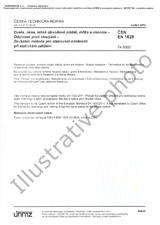We need your consent to use the individual data so that you can see information about your interests, among other things. Click "OK" to give your consent.
ČSN ETSI EN 300338-1-V1.6.1 (875031)
Technical characteristics and methods of measurement for equipment for generation, transmission and reception of Digital Selective Calling (DSC) in the maritime MF, MF/HF and/or VHF mobile service; Part 1: Common requirements
Translate name
STANDARD published on 1.11.2021
The information about the standard:
Designation standards: ČSN ETSI EN 300338-1-V1.6.1
Classification mark: 875031
Catalog number: 513001
Publication date standards: 1.11.2021
SKU: NS-1041201
The number of pages: 48
Approximate weight : 144 g (0.32 lbs)
Country: Czech technical standard
Category: Technical standards ČSN
The category - similar standards:
Receiving and transmitting equipmentNavigation and control equipment
Annotation of standard text ČSN ETSI EN 300338-1-V1.6.1 (875031):
V1.6.1
The present document states the minimum requirements for equipment to be used for generation, transmission and reception of Digital Selective Calling (DSC) for use on board ships.
DSC is intended to be used in the Medium Frequency (MF), High Frequency (HF) and Very High Frequency (VHF) bands of the Maritime Mobile Service (MMS), for distress, urgency and safety communication and general communications.
The present document is part 1 of a multi-part deliverable that covers the requirements to be fulfilled by:
- - DSC equipment integrated with a transmitter and/or a receiver;
- - DSC equipment not integrated with a transmitter and/or a receiver.
These requirements include the relevant provisions of the ITU Radio Regulations [i.15] and Recommendations ITU R M.493-15 [2], M.541 10 [3], M.689 3 [4] and M.1082-1 [5], the International Convention for the Safety Of Life At Sea (SOLAS) [i.14], and the following resolutions/circulars of the International Maritime Organization (IMO): A.694(17) [14], A.803(19) [15] amended by MSC.68(68) Annex 1 [17], A.804(19) [16], MSC.68(68) Annex 2 [17], A.806(19) [18], MSC.68(68) Annex 3 [17], MSC 302(87) [12] and MSC/Circ.862 [19].
Equipment for generation, transmission and reception of DSC designed according to the following equipment classes:
- - Class A: includes all the facilities defined in annex 1 of Recommendation ITU-R M.493-15 [2] and complies Performance Standards A.803(19) for VHF [15], A.804(19) for MF [16] and A.806(19) for MF/HF equipment capable of voice and DSC [18].
- - Class D: provides minimum facilities for VHF DSC distress, urgency and safety as well as routine calling and reception as recommended by IMO MSC/Circ.803 [i.2] for non-SOLAS vessels participating in the GMDSS and defined by Recommendation ITU-R M.493-15 [2].
- - Class E: provides minimum facilities for MF and/or HF DSC distress, urgency and safety as well as routine calling and reception as recommended by IMO MSC/Circ.803 [i.2] for non-SOLAS vessels participating in the GMDSS and Recommendation ITU-R M.493-15 [2].
- - Class H: provides minimum facilities for handheld VHF DSC distress, urgency and safety as well as routine calling and reception as recommended by IMO MSC/Circ.803 [i.2] for non-SOLAS vessels participating in the GMDSS and Recommendation ITU-R M.493-15 [2].
- - Class M: provides minimum facilities for VHF Man Overboard devices as defined in Recommendation ITU R M.493-15 [2].
NOTE 1 - Class A equipment may support the optional semi-automatic/automatic service in accordance with Recommendations ITU R M.689 3 [4], M.1082-1 [5] and M.493-15 [2], tables A1-4.10.1 and A1-4.10.2 and are encouraged to do so.
NOTE 2 - Class D and Class E equipment may also support the optional semi-automatic/automatic service.
NOTE 3 - Class D, Class E, Class H should provide a defined list of functions as a closed list for these classes of equipment is the preferable approach to ensure safe and simple operation. Optional functions should be avoided, with the intention to provide the same functionality of all equipment of one class
Preview of the standard ČSN ETSI EN 300338-1-V1.6.1 (875031)
We recommend:
Technical standards updating
Do you want to make sure you use only the valid technical standards?
We can offer you a solution which will provide you a monthly overview concerning the updating of standards which you use.
Would you like to know more? Look at this page.




 Cookies
Cookies
